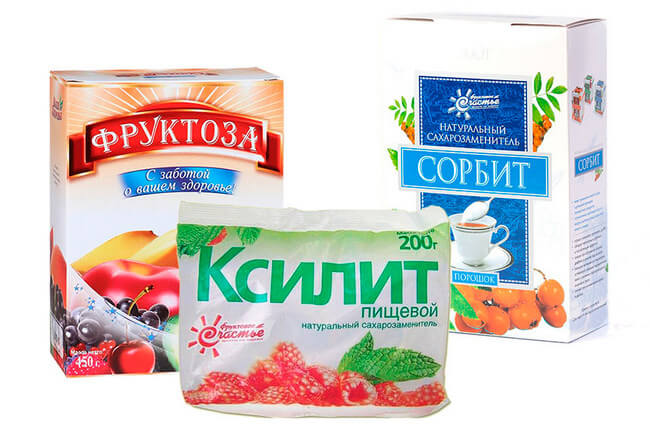What people will not do in order to lose weight fast! For example, they try to deceive their own body, drowning out the feeling of hunger in various extreme ways. They sleep for 15 hours a day (taking sleeping pills), drink 5 liters of water per day (in order to create the feeling of a full stomach), and instead of natural soy meat, they can enumerate the tricks indefinitely.
Including the well-known sugar substitute – a substance that is not inferior to regular sugar in sweetness, but which is extremely low in calories. But will the body “deceived” in this way suffer from it? How safe is it for your health? Is it worth changing, as they say, the bad for the good?
What is this?

Sugar substitutes are natural substances or synthetically developed chemical compounds that are able to give food the same sweetness (sometimes to a greater extent, sometimes to a lesser extent) as sugar. They have one indisputable advantage – they are much less caloric.
It is not surprising that they are so actively used in dietetics. Almost any diet prohibits the consumption of sweets, which contribute to weight gain, provoke the development of diabetes and obesity. Many people suffer from the so-called sugar addiction and experience an almost painful craving for sweets. All of them also have excess weight and cannot follow any diet because of their pathology.
So how can you not be tempted by a sugar substitute in such a situation? The sweetness remains the same, and the calories are almost zero! And everything would be perfect in this story, if from time to time there were not research results warning that such substances are an evil that slowly but surely kills the body. Despite loud statements, the production of food additives that fall under this stamp is not prohibited. They continue to produce them in beautiful packaging and actively include them in various foods, writing on them in large letters: “WITHOUT SUGAR!”.
To trust the organizations that monitor the quality and safety of products, which do not consider it necessary to prohibit the production of sugar substitutes? Or to be vigilant and listen to those who openly declare their harmfulness? Let’s try to weigh the pros and cons.
Benefits and harms
Benefits
However, those who go too far and completely deny any benefits of sugar substitutes are not right either. At certain points they provide support to the body:
- they are useful for losing weight;
- they help smooth out the desire for sweets;
- they replace sugar for diabetics;
- they reduce the risks of obesity and diabetes;
- they have a low glycemic index, which means they do not cause sharp jumps in sugar;
- they have a low insulin index, which means they do not put an additional burden on the pancreas.
If we talk about comprehensive health benefits, then, of course, sugar substitutes practically do not provide them. They do not possess antitumor or anti-inflammatory properties, do not improve digestion, and do not contribute to the recovery from any diseases. Simply, under certain conditions (for weight loss and for diabetes) they are an optimal alternative to sugar.
In January 2019, the British Medical Journal published a hard-hitting review article summarizing the experience of 56 studies on the benefits and harms of sugar substitutes. As a result, it was concluded that these substances do not have any positive effect on the body. The work caused a wide resonance in scientific circles; the controversy over it continues to this day. Its opponents, I must say, responded very eloquently to the known facts of the use of some sugar substitutes in medicine. Did you know? Here are some examples:
- fructose contributes to the rapid removal of alcohol from the blood without side effects;
- xylitol preserves dental health, is used in the therapy of diabetes mellitus and diseases of the middle ear;
- sorbitol is prescribed as a medicine for constipation;
- stevioside is used in the treatment of obesity and hypertension;
- aspartame is registered as a pharmacy medicine in the form of tablets for the treatment of diabetes mellitus, obesity, and other diseases that require the exclusion of sugar from the diet;
- saccharin counteracts the development of an already existing tumor.
This list could go on and on. Many sugar substitutes have found application in medicine, in the composition of completely certified medicines, not even dietary supplements! Can it be said that they do not bring any benefit at all?
And one more fact for skeptics: the production of sugar substitutes is officially approved by such organizations as the FDA (Food and Drug Administration), JECFA (Joint Expert Committee on Food Additives), WHO (World Health Organization), EFSA (European Food Safety Agency). Such authoritative institutions, before issuing a verdict, carefully study all the materials of the conducted research.
What is the harm?
And yet, the publication of negative results of all kinds of research made people doubt and wonder whether sugar substitute is harmful to the human body. Here are just a few terrifying facts:
- aspartame provokes brain cancer and leads to kidney failure;
- acesulfame potassium acts as an excitant on the psyche;
- saccharin is a dangerous carcinogen that provokes the development of cancerous tumors;
- cyclamate causes bladder cancer;
- xylitol completely eliminates the intestinal microflora;
- maltodextrin causes a sharp increase in blood sugar, provokes autoimmune disorders, contributes to the development of Crohn’s disease;
- sucralose is generally obtained from sugar treated with chlorine, with all the ensuing consequences for health.
And such “horror stories” exist for almost every sugar substitute. Maltodextrin gets a special punishment. But it is used only in the food industry as an additive E459, observing the permissible norms. No one is talking about its use for weight loss separately, for example. And to accuse it of developing Crohn’s disease, the causes of which have not yet been clarified by science, is absurd. Similarly, to say that sucralose is chlorinated sugar. For some reason, everyone drinks baking soda (sodium chloride) and admires its useful properties, and as soon as it comes to a sugar substitute with a similar chemical composition, this is harmful!
It makes no sense to assert that all this is an absolute untruth, fabrications of opponents, and so on. There is no smoke without fire. However, sensible reasoning no one has repealed. Firstly, if you delve into the study of the results of research, which prove that most of these substances are dangerous carcinogens that provoke the development of cancerous tumors, it turns out that they were carried out exclusively on rodents. Science now does not trust such experiments. Secondly, in contrast to them, there are other studies that have proven the absolute non-toxicity of these food additives.
More likely and possible side effects, but no longer so serious, which individual sugar substitutes can cause:
- glucose: disturbance of water-electrolyte balance, venous thrombosis, phlebitis, increased sweating, polyuria, glucosuria;
- xylitol: digestive disorders, allergic reactions, obesity, diarrhea;
- sorbitol: weakness, dizziness, nausea, flatulence, diarrhea, hyperglycemia;
- stevioside: intestinal disorders, hypoglycemia, hypotension, allergy;
- erythritol: diarrhea, allergic reactions;
- aspartame: headaches, increased blood pressure;
- cyclamate: allergic reactions, headaches, skin rashes.


